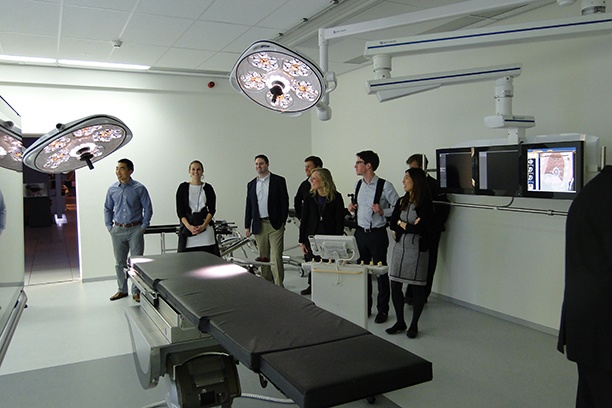New health care challenges lead to innovation
March 24, 2016 | 2 min read
Hospitals are undergoing strong developments and are facing new challenges. Besides the health care system, medical science and research departments are also experiencing a transition. They need to increase their social impact, become more efficient and make careful considerations. During a recent exchange visit between Tuck School of Business and TIAS, the University Medical Center Utrecht (UMCU) provided an insight into how they handle these developments.
Hospitals are increasingly specializing, and this is reflected in the UMCU's strategy. The hospital has appointed six core strategic core areas: neurology, infection & immunity, cardiovascular diseases, oncology, child care and regenerative medicine. Other disciplines are provided by other hospitals and UMCs at a regional and national level, Prof. Dr. Margriet Schneider, CEO of the UMCU, told the group of MBA students from Tuck School of Business (US).
The UMCU is looking for collaboration with other knowledge-intensive parties in order to bridge the gap between knowledge and practice. The hospital works together with educational, research, government and commercial institutions within the "One Health Campus" at the Utrecht Science Park. By conducting more translational and clinical research, the UMCU wants to quickly translate new knowledge and innovative technology to the best possible diagnoses and treatments.
Palliative care
The "end of life" discussion illustrates the complicated ethical and legal problems that hospitals in 2016 have to face. If a patient in the Netherlands wants to stop his treatment, then he can indicate this in a living will. The doctor will take a decision from a medical point of view, explains a legal advisor from the UMCU.
Prof. Dr. Peter van der Voort, Academic Director of the TIAS Executive Master of Health Adminstration, must regularly take such decisions at the Intensive Care where he works and provides information. "If we think that it is medically pointless to continue with the treatment, then we switch to palliative care. Our decisions are always taken together with the entire medical team, once all other options have been tried." Nardo van der Meer, professor of care management at TIAS, adds: "This is an extremely delicate process. If a patient is older than 65 years of age, we follow a conversational procedure in which we discuss the end of life possibility with the patient."
This is a sensitive topic, certainly for foreign visitors. "The right to live, the right to die. But in Brazil the latter is unthinkable", one of them says. Driven by cultural values and the fear of culpable interventions, doctors in Brazil and the USA often continue treatment, even when this is not in agreement with the patient. "There is a great fear of culpable medical interventions in the United States which results in excessive use of health care."

Experiencing innovative health solutions in the Philips Customer Visit Center in Best.
Technological innovation
As part of the exchange, the MBA students from Tuck School of Business also paid a visit to the Philips Customer Visit Center in Best. There they were introduced to the wide variety of innovative solutions and products which are developed by Philips Healthcare. In the Ambient Experience room for instance, a demonstration was given of how a clinical environment can be made less frightening with the use of dynamic lighting. Benno Tieke, director of business creation at Philips, showed how meaningful innovations are possible by collaborating in an open business process.
How will hospitals and care centers develop themselves in the light of the many technological and social changes? One of the students says: "I think that we belong to the generation which can make change happen and which will step across borders, agendas and politics."
Executive Master of Health Administration
Every year, an exchange is made at the TIAS Master of Health Administration (MHA) with Tuck School of Business of the Dartmouth College. Yearly, MBA students from the American business school visit TIAS. In turn, participants of the MHA make a study tour to Tuck School of Business in New Hampshire. During the visit, they obtain an insight into the American health care system and exchange experiences with American participants and professors about challenges in health care. Want to learn more about the Executive Master of Health Administration at TIAS?
Read more about this Master